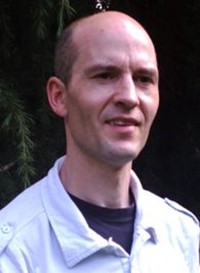Richard Monte

About Author
Richard Monte was born in Kingston-upon-Thames, Surrey and went to school in Cambridgeshire and Northamptonshire.
He studied History at the University of London, specialising in Eastern Europe. His first job was in journalism but, realising he wanted to be an author, he left to take up freelance writing and bookselling. He lives in St Albans, Hertfordshire, with his Polish wife and two children.
He is a regular reviewer for Carousel Magazine and has also contributed articles and book reviews to the TES, Scholastic Education Plus, History Today and the BBC History Magazine.
His first children's book was The Flood Tales, an environmental fable based on the Noah's Ark Story. The Dragon of Krakow, a collection of Polish folk tales, was published by Frances Lincoln in 2008 and The Mermaid of Warsaw followed in 2011.
Interview
Q: What is your favourite word?
Truffula - from the colourful woolly trees featured in Dr Seuss's wonderful book - The Lorax - an environmental fable chronicling the plight of trees in an industrial world. He wrote it at the beginning of the seventies, but the book has lost none of its resonance.
Q: What profession other than yours would you like to attempt?
I've often thought how wonderful it would be to illustrate children's books - especially all those old fairy tales and bring them vividly to life with colourful drawings.
Q: What is the most interesting place you have ever visited?
The Wieliczka Salt Mine just outside Krakow, which is one of the most amazing and awe-inspiring places on earth. It's been in operation since the 13th century and now consists of over 300 kilometres of underground passages. My wife introduced me to it on one of our many trips to her home country, Poland. It's a magical place full of mystery and legend. There are underground lakes, a fascinating museum depicting salt mining through the ages, a sanatorium, and entire chapels which have been carved out of rock salt - everything from the floors to the chandeliers.
Q: What is the best advice anyone has ever given you?
'Start your novel. You'll never find happiness otherwise.' Advice from a university lecturer at the end of my degree.
Q: What has life taught you?
How precious our little world really is when viewed from the depths of a cold and hostile universe. Where else are there such beautiful flowers, magnificent trees and wonderful animals?
Q: What was your favourite book as a child?
My favourite book as a child was The Hobbit. Although I've read it many times since then, it never seems to lose its magic. What makes Bilbo so endearing, is that he is small and insignificant... but of course he ends up being the most important character of all. There are all those wonderful adventures he has on his way to help the dwarves claim their treasure from the dragon Smaug: meetings with trolls, elves, a shapeshifter and a forest full of spiders... But it's his encounter with Gollum under the Misty Mountains, almost woven in by Tolkien as an afterthought, which opens up an epic story of good versus evil.
Q: What book do you wish you had written?
I would like to have written Gulliver's Travels. The amazing quality about this book is that as well as being a biting satire upon the human condition, it is one of the most exciting adventure stories ever created, with a childlike quality that belies its seriousness. In a letter to Swift in 1726, John Gay famously wrote that the novel "is universally read, from the cabinet council to the nursery".Traveller's tale, fiction, fantasy; Swift's masterpiece is hard to pin down. But there is no escaping the little people of Lilliput, the giants of Brobdingnag, the flying island of Laputa or the intelligent horses who live in the country of the Houyhnhnms.
Q: Was there a specific moment in your life when you decide to become a writer?
At school I enjoyed subjects like English and History, writing essays and making up stories. I even entered a Post Office letter writing competition and received a certificate of commendation, which I still have, but it wasn't until I left university that I realised I wanted to follow a literary career. I started working on a local newspaper as a junior reporter, then decided to take up bookselling, which I found fitted in well with my freelance writing activities.
Q: Where do you do your writing?
Mostly sitting at my desk in the living room, which I try to keep organised but inevitably is always piled up with books waiting to be reviewed, manuscripts seeking publishers and work in progress.
Q: Where do you get your greatest ideas from?
When I wrote The Flood Tales I was inspired by the Biblical tale of Noah and I began wondering how that story could be reconciled with modern scientific ideas about pollution and global warming, as possible reasons for the causes of floods. The Dragon of Krakow originated from frequent travels to Poland, where I came into contact with the myths and legends of this beautiful and inspiring country.
